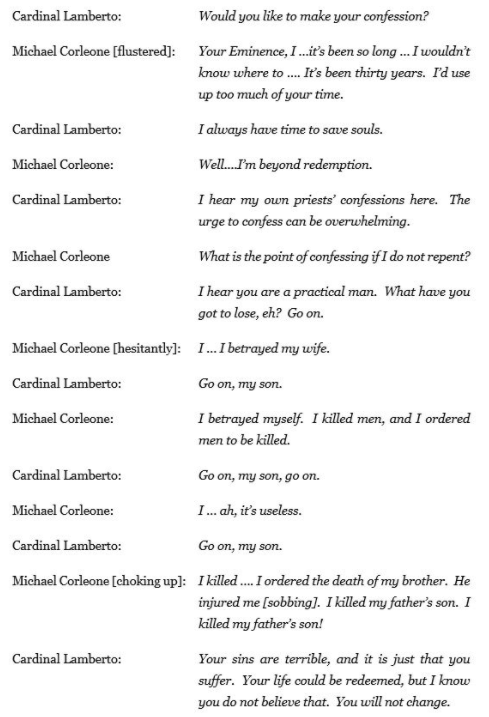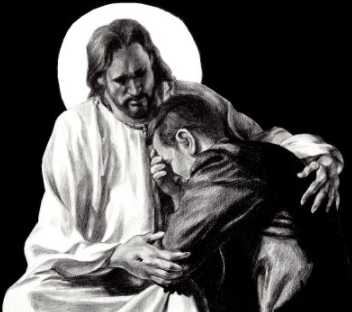
In the Godfather III, Michael Corleone, the Godfather, confesses to the priest, Cardinal Lamberto:

Repentance
The priest’s words – “Your life could be redeemed, but I know you do not believe that. You will not change” are disappointing. The priest should encourage Michael Corleone to repent, if necessary, strongly, knowing Michael Corleone must overcome the habits of a lifetime, entrenched habits which obscure his understanding of good and evil, right and wrong.
No matter what the sin, Jesus simply asks for repentance. There is no unforgiveable sin, other than the unwillingness to repent, the rejection of God’s mercy. The priest, who stands in persona Christi, has in mind the father’s forgiveness of the prodigal son, the numerous persons miraculously cured by Jesus of Nazareth, the woman caught in the act of adultery, the Samaritan woman, Peter and the other apostles who deserted Jesus at the crucifixion, the “good thief” who repents as he dies on the cross, Jesus who dies on the Cross for all sinners.

Mercy
The Sacrament of Confession or Reconciliation is the mercy of Jesus of Nazareth, of God, par excellence. For the repentant sinner, no sin is too grave, no sin committed too often, no sin committed too callously, to be forgiven. A good priest, hearing Confession, will not be shocked, will not be scandalised, by what he is told. Even a bad priest, even a very bad priest, will never disclose what he is told in Confession, not even where the priest risks imprisonment or death. The priest stands in the place of Jesus of Nazareth, of God. The priest who betrays the secret of the confessional betrays his priesthood.
I have nothing to confess
A common phenomenon is for persons to say they are not aware of having committed any sin. St John says: ‘If we say we have no sin, we deceive ourselves, and the truth is not in us.’ This attitude demonstrates a lack of self-knowledge, usually caused by years of self-delusion. Ask a person’s spouse, or children, or friends – and they will see plenty of faults!
A way of examining one’s conduct is to consider it in the light of the Ten Commandments, the Beatitudes, the cardinal virtues (prudence, justice, fortitude, temperance), the theological virtues (faith, hope, charity). The Catechism speaks of a second conversion which is a struggle against oneself, which occupies one’s whole life.
Structure
There is a fundamental structure to the sacrament of Confession which involves firstly conversion (contrition, confession and satisfaction), and secondly the action of the Church through the priest acting in the person of Jesus Christ.
Secret Auricular Confession
The Church is concerned to preserve secret auricular Confession. Penitents are entitled to confess secretly. This tradition of private auricular Confession derives from the Irish missionary monks of the 6th to 9th centuries who evangelised modern-day France, Germany and Northern Italy.
In the early Church, when penances were severe, burdensome, public, and humiliating, baptism was often delayed into adulthood, and confession, until shortly before death. By contrast. the Irish way of frequent private auricular Confession of sins, with a penance performed privately and not publicly – which became the way of the Church, was accompanied by spiritual direction helping the penitent grow in holiness. The Irish monks, who introduced the Irish way of Confession to western Europe, and to the world, imposed a modest penance, taking on themselves the penance which might otherwise have been imposed on the penitent. These saintly confessors were often regarded with great affection by their penitents, both for their silence, and for their sober advice.
The practice of regular secret auricular Confession helps many persons grow in self-knowledge, and in the difficulties of everyday life, in circumstances of suffering, sometimes great suffering. The practice of regular secret auricular Confession helps many penitents gradually acquire holiness.
Just how integral Confession is to the tradition of the Church is reflected in the reference to Confession in the Didache, one of the most ancient documents of the Church, apart from Scripture. There, possibly first century, Christians are admonished:
And on the Lord’s Day, after you have come together, break bread and offer the Eucharist, having first confessed your offences…
Regular Confession
Frequent regular Confession helps penitents overcome deeply ingrained habits of sin. Regular Confession makes for lives which flourish, marriages and families which flourish, societies which flourish. It is no exaggeration to say that the frequency with which persons confess their sins is a good indicator of the extent to which Christian living flourishes in a given society.
Requiring Disclosure
Legislation requiring priests to disclose sins confessed in the Sacrament of Reconciliation does not address the common good. There is no evidence those who repeatedly commit criminal acts regularly confess. Quite the contrary.
If a penitent knows the priest is under an obligation under civil law to disclose the sins he or she has confessed, the penitent will not go to Confession. If the priest (God forbid!) did disclose sins confessed to the police, the information would be useless to the police, given that the priest may not know the identity of the penitent, nor the sort of detailed information that would be useful, either as a lead in investigation, or admissible in court. Legislation mandating disclosure of crimes disclosed in Confession will achieve nothing, simply making persons reluctant to go to Confession.
Nicola Gobbo
The Victorian McMurdo Royal Commission into the Management of Police Informants, arising out of the misconduct of criminal defence barrister Nicola Gobbo snitching on her own clients, recognised that obliging a professional (e.g., a lawyer or doctor) to maintain confidentiality is not only in the individual client’s interest, but also in the public interest. A client’s trust in his or her lawyer is in the interests of the administration of justice, and a patient’s trust in his or her doctor is in the interest of public health. There is a public interest in persons being able to obtain independent objective advice, a sine qua non of such advice being frank disclosure. A penitent’s ability to obtain independent and objective advice, accompanied by repentance, works for the public good. According to the McMurdo Report, confidentiality recognises the value to society of encouraging persons to seek advice from an Iman, rabbi, minister or priest, in circumstances where they may be reluctant to bare their soul to a stranger.
Misprison of Felony
Quite different is the situation where, for instance, the principal of a school, or a member of a school board, or other administrator, becomes reasonably aware of a serious crime having been committed, and fails to disclose that crime to the police, leaving children at risk of further criminal acts. Here there is no obligation of confidence, quite the contrary, an obligation to act for the good of the children entrusted to the school’s care. There is an important public interest behind what used to be called misprision of felony, and remains a serious legal obligation.
Absolution
A priest is obliged to withhold absolution if the penitent has not formed the intention not to sin again. A person who regularly commits crimes but who has no intention of not sinning cannot be granted absolution. That is why the account of the Godfather Michael Corleone’s Confession does not ring true. The confessor, knowing Michael Corleone had not resolved not to sin again, ought to have refused absolution.
Michael Corleone’s life, his papal knighthood, his donations to the Church, his attendance at Mass, his care for his family, the warmth of his many personal relationships, did not help him, unless he repented of his life of murder, of extortion, of theft, of lying, of disregard both for the law of the state, and of the natural law which binds all human beings. Michael Corleone is the epitome of inconsistency, apparently a reputable businessman, apparently a loving father, apparently a faithful husband, apparently a good citizen, apparently a faithful Catholic, but, in fact, a dealer in everything opposed to those things. Hypocrisy is the way of Michael Corleone.
Year of St Joseph
Pope Francis has proclaimed a Year of St Joseph concluding on 8 December 2021. This Year of St Joseph is the 150th anniversary of the proclamation in 1870 by Pope Pius IX of St Joseph as the Guardian of the Universal Church.
St Joseph is the quiet man from whom not a word is heard in the Gospels, but who, acting prudently, and inspired by the angelic messages sent by God, nurtures and protects the baby Jesus, and his mother, Mary. The priest in the Sacrament of Reconciliation imitates the fatherhood of God, the fatherhood of St Joseph.
St Joseph is the Patron of the Universal Church, the continuation of the Body of Christ in history, even as Mary’s motherhood is reflected in the motherhood of the Church.

Fatherhood
St Joseph teaches us how to be fathers. As Pope Francis points out, a man does not become a father simply by bringing a child into the world, but by taking up the responsibility to care for that child. Whenever, a man accepts responsibility for the life of another, in some way, he becomes a father to that person. Hence the fatherhood in persona Christi of the priest in Confession. At a time when many Australian children have no significant ongoing relationship with their father, surely a very significant form of poverty, devotion to St Joseph will help men to recover their role as fathers.
Merciful Father
St Joseph, the foster-father of Jesus, is foreshadowed by Joseph (whose story is recounted in Genesis) who forgave the treachery of his brothers, selling him into slavery. The Egyptians are told by the Pharaoh in time of famine, Go to Joseph, as we are told by Pope Francis today, Go to Joseph.
It is in this context, in his letter ‘Patris Corde: On the 150th Anniversary of the Proclamation of St Joseph as Patron of the Universal Church,’ that Pope Francis urges us to encounter Jesus in the Sacrament of Reconciliation. Pope Francis likes to think that it was from St Joseph that Jesus drew inspiration for the parable of the Prodigal Son and the Merciful Father. The priest in Confession stands in the place of Jesus Christ, in the place of God, dispensing mercy, just as Christ from the cross, forgave those who crucified him, and forgave the sins of the repentant thief.
Michael McAuley
